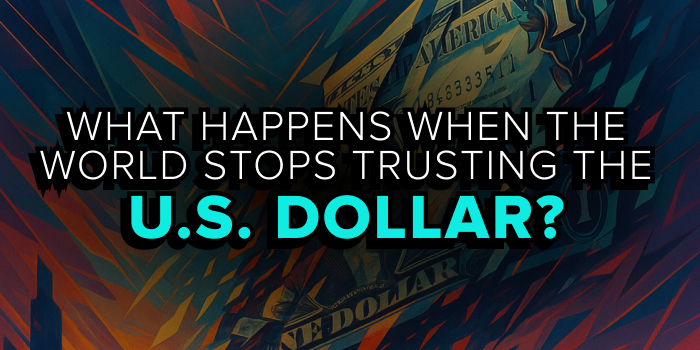What Happens When the World Stops Trusting the U.S. Dollar?

- Harvard Economist Kenneth Rogoff warns that U.S. dollar dominance is quietly eroding, threatening the financial advantages America has long enjoyed.
- As global trust in U.S. institutions weakens, alternative currencies and digital options are slowly gaining ground despite their imperfections.
- The consequences of this shift may be gradual but could reshape the global financial order.
When empires decline, it rarely happens all at once. It’s not a cliff, but a slow, grinding erosion, like a river cutting its way through a mountain until, eventually, what looked eternal turns to dust. That’s how Kenneth Rogoff sees the future of the U.S. dollar.
The Harvard economist and former IMF chief economist isn't calling for a sudden collapse of dollar dominance. But he is clear-eyed about the forces chipping away at it, and the consequences the United States will eventually face. The world has changed, he argues, and America's financial power is beginning to show cracks.
The Peak Behind Us
For decades, the dollar has been the bedrock of global finance. Around 60% of central bank reserves are still held in dollars. About 80% of commodity trades are priced in dollars. And roughly 90% of currency trades touch the dollar at some point. Even if you’re trading Australian dollars for New Zealand dollars, chances are the transaction routes through the greenback.
Yet Rogoff believes the high-water mark for dollar dominance came around 2015. Since then, the underlying pillars have weakened. America's openness to trade has faded. Its immigration system, long a magnet for talent and capital, has tightened. Faith in the rule of law has frayed.
Political dysfunction, tariff wars, cracking down on immigration, and the weaponization of finance have all accelerated the process. "Trump's been an accelerant. It's just incredible, the damage he's doing," said Rogoff, who’s careful not to blame only one side, noting that Democrats also have contributed to a perceived erosion of legal norms, the broader message is unmistakable: The world is losing faith in the stability of the U.S. system.
Still, dominance doesn't disappear overnight. The dollar enjoys enormous network effects. As Rogoff points out, it's costly to switch from an embedded system, even if it's flawed, to an unproven alternative. But with enough pain and uncertainty, people adapt. They always do.
The Alternatives Aren't Perfect
If not the dollar, then what?
Europe’s euro is a distant second. Rogoff praises the creation of the euro as a political achievement, but remains skeptical about its resilience. Europe’s uneven economies, aging demographics, and limited military reach constrain its ability to project the same global power that underpins the dollar.
China’s renminbi is rising, but slowly and with serious limitations. Capital controls remain tight, and trust in Chinese governance is thin. Still, incremental moves — such as settling more trade in RMB, particularly among BRICS nations — signal a bigger trend. China’s development of digital currency is part of the same strategy: building alternatives to the U.S.-dominated financial networks.
Interestingly, Rogoff is more bullish on the idea of regulated stablecoins than on central bank digital currencies. He believes private, well-regulated digital dollars or euros could eventually play a larger role than clunky, government-issued digital money. But even that future, he emphasizes, will take decades to materialize.
For now, there is no clean substitute. Instead, the erosion of dollar dominance likely means greater fragmentation: a less efficient, more regionalized global financial system.
Perks at Risk
Why does any of this matter to the average American? Because the benefits of dollar dominance are tangible, even if invisible most of the time. Chief among them: lower borrowing costs.
When global investors rush into dollars during crises, U.S. interest rates fall. This "exorbitant privilege" has allowed the U.S. to run larger deficits at cheaper costs than almost any other nation. It has been a critical advantage during recessions, wars, and pandemics. If the dollar loses its special status, that privilege erodes. Rogoff estimates U.S. borrowing costs could rise by half a percentage point to a full percentage point. In a country already running unsustainable deficits, that would be a painful shift, "adding insult to injury," as Rogoff puts it.
Even more critical is the option value of borrowing in a crisis. In 2008 and 2020, the world demanded dollars precisely when the U.S. needed to borrow trillions of dollars. In the future, if demand for dollars weakens, the government may find itself needing to pay up—or worse, facing real limits on its fiscal flexibility just when it needs it most.
Financial repression, essentially forcing domestic institutions to hold government debt, may become more common. Taxes may have to rise. Choices that are put off will eventually have to be made.
"Borrowing is great. Owing a lot of money is not great," Rogoff says bluntly.
He’s not forecasting imminent doom, but he’s sounding a warning against complacency. The assumption that the dollar will remain supreme, regardless of how much debt the U.S. accumulates or how chaotic its politics become, is a dangerous one.
Rogoff's message isn't just for policymakers or markets. It’s aimed squarely at the economic profession too, urging it to shake off decades of complacency and confront hard truths about debt, resilience, and the fragile foundations of global finance.
The river is still carving its way through the mountain. The erosion is slow, but it's happening.
This is based on an episode of Top Traders Unplugged, a bi-weekly podcast with the most interesting and experienced investors, economists, traders and thought leaders in the world. Sign up for our Newsletter or subscribe on your preferred podcast platform so that you don't miss out on future episodes.
Most Comprehensive Guide to the Best Investment Books of All Time

Most Comprehensive Guide to the Best Investment Books of All Time
Get the most comprehensive guide to over 600 of the BEST investment books, with insights, and learn from some of the wisest and most accomplished investors in the world. A collection of MUST READ books carefully selected for you. Get it now absolutely FREE!
Get Your FREE Guide HERE!




